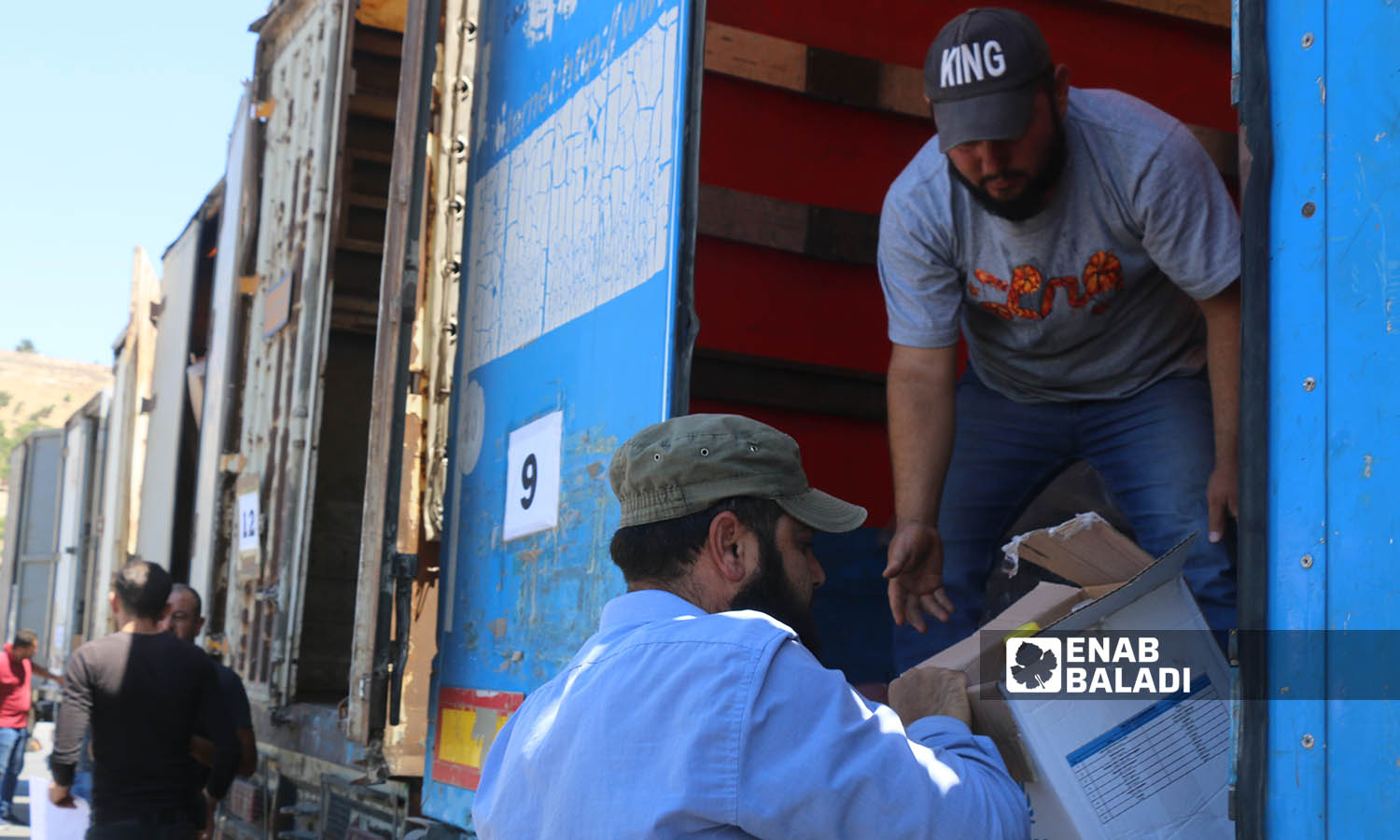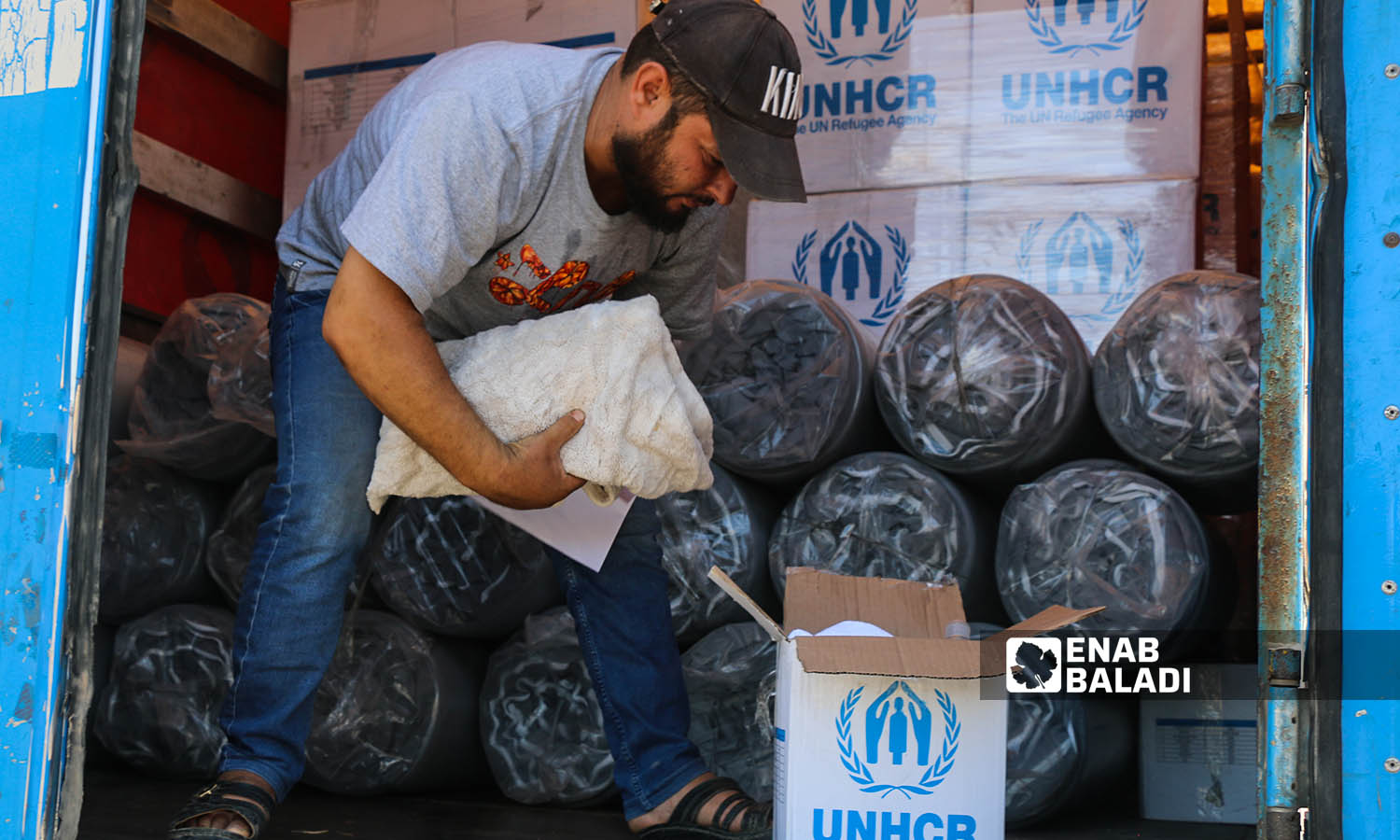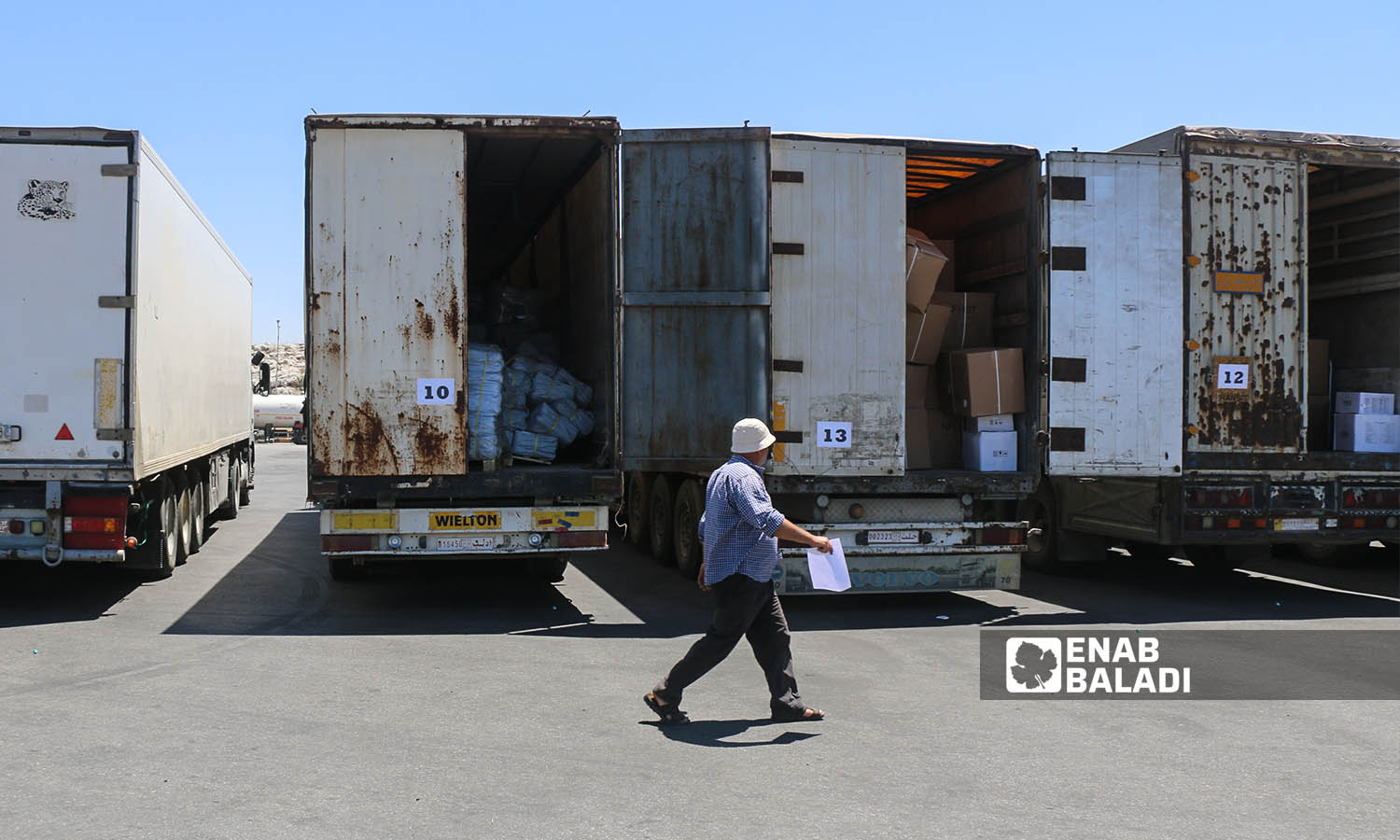



Enab Baladi – Lujain Mourad
Prior to the vote on Security Council Resolution No. 2642, which permits the delivery of humanitarian aid from Turkey to northwestern Syria through the Bab al-Hawa border crossing, Russian statements had emerged in favor of the extension of the resolution and contradicted earlier statements in which Russian rejection had been confirmed.
Early January, diplomats told Reuters that Russia has signaled to UN Security Council counterparts that it will likely allow humanitarian aid deliveries from Turkey to about 4 million people in northwestern Syria for six more months, contrary to statements by Russia’s ambassador to the UN in late December 2022 in which he confirmed his country’s rejection of that decision, painting it as a “violation of Syria’s sovereignty.”
An abrupt change prior to the vote on the resolution, scheduled for 10 January, gave a reassuring signal to Syrians that Russia would not use its veto power and raised questions about the reasons for the reversal of its position.
Over the past years, Russia has continued to control the decision to extend aid deliveries by means of its veto right, successfully reducing the number of crossings used in aid deliveries to the Bab al-Hawa border crossing.
During the Security Council’s vote on 12 July 2022, Russia reduced the extension of the resolution to 6 months, while the proposed period was one year.
Russia’s position is due to it opting for cross-line delivery of humanitarian aid (through regime-held areas) to enable the central authority in Damascus to control the UN aid file, which has been repeatedly reflected in Russian statements about the said file.
In contrast, Russia’s new position has emerged contrary to expectations that it would steadfastly refuse to extend the cross-border aid delivery decision, coinciding with progress on the process of Turkish-Syrian rapprochement that Russia has been pushing for months.
Political economist Pr. Yahya al-Sayyed Omar told Enab Baladi that “Russia’s flexibility towards the aid file is expected and is linked to the future of the rapprochement between Turkey and the Syrian regime.”
In al-Sayyed Omar’s view, the Turkish-Syrian rapprochement and the foreseeable future understandings between the parties are “decisive” in formulating the Russian position.
The Russian position is expected to be more flexible regarding the aid file in the future in the event of harmonious positions between Turkey and the Syrian regime, while the lack of harmony will restore the Russian position to what it was previously, said al-Sayyed Omar.
The US position on the Turkish-Syrian rapprochement needs to be taken into account; the issue is linked to, among others, the US, which has not yet shown a clear position, the political economist noted.
The Russian-encouraged file of the Syrian-Turkish rapprochement has seen many moves since late 2022, most notably the holding of a tripartite meeting that brought together the Turkish, Russian, and Syrian defense ministers in the Russian capital, Moscow, in December of the same year.

Workers inspecting a United Nations aid convoy after entering Syria through the Bab al-Hawa border crossing with Turkey – 28 July 2022 (Enab Baladi – Iyad Abdul Jawad)
Russia accuses the international community of politicizing the aid file by insisting on cross-border aid delivery, while Moscow continues to utilize the file as a bargaining chip for political interests.
Although the fate of some 4 million people dependent on humanitarian aid in northwestern Syria depends on the cross-border aid file, the Syrian regime and its Russian ally deliberately politicized it to serve their interests.
Russia’s rejection of cross-border aid delivery for “legal” reasons is a pretext for pressuring Security Council counterparts to approve cross-line aid delivery, said Pr. Yahya al-Sayyed Omar.
For his part, Raed al-Saleh, director of the Syria Civil Defense organization (the White Helmets), told Enab Baladi that Russia had linked the continuation of aid delivery to concessions from the international community aimed at supporting the Syrian regime and trying to float it politically, considering that the file had turned into a “political battle with a humanitarian cover.”
Local and international organizations refuse to subject the humanitarian file and life-saving aid to Russian blackmail and to give the Syrian regime greater control over humanitarian aid through pressure to increase the frequency of cross-line aid convoys, al-Saleh said.
In the face of Russian pressure to halt the cross-border aid delivery, local and international organizations, along with donor countries, have taken steps to mitigate the politicization of aid and rescue millions of Syrians in northwestern Syria.
As the humanitarian crisis worsens and more and more people are fully dependent on aid, the region’s need for continued aid deliveries away from the hazard of being manipulated or turned into a tool in the hands of the Syrian regime is deepening.

Workers inspecting a United Nations aid convoy after entering Syria through the Bab al-Hawa border crossing with Turkey – 28 July 2022 (Enab Baladi – Iyad Abdul Jawad)
Talk has emerged over the past days of a new mechanism for delivering aid to northwestern Syria.
The director of the White Helmets organization, Raed al-Saleh, said that Britain and the US are working on an independent mechanism to deliver aid separately from international organizations, dubbed the Interim North Syria Aid Fund (INSAF).
The mechanism provides three types of aid, namely cash aid to the population in northwestern Syria, educational aid, and medical aid. It will be implemented in mid or late January.
The initiative could contribute to alleviating the humanitarian crisis, whether or not the United Nations mandate to introduce assistance has been renewed, according to al-Saleh. It could only cover the need “partially” in case Russia manages to block the extension of the resolution, he pointed out.
The American Relief Coalition for Syria (ARCS) and a group of Syrian organizations prepared a study on the legality of extending the cross-border aid delivery resolution without a Security Council vote in view of the region’s growing humanitarian needs and the continued politicization of aid by the Syrian regime and its Russian ally.
The study issued by the Guernica 37 organization, commissioned by ARCS and its partners, including the White Helmets, in November 2022, is the first evidence to prove that cross-border aid delivery is legal and not amenable to politicization.
While the Syrian regime and its Russian ally have a problem with international organizations crossing the Syrian border, the study proved that the mechanism for delivering aid through the Bab al-Hawa border crossing is trans-border, as the role of representatives of international agencies ends at the Turkish border, while aid is delivered to local non-governmental partner organizations in Syria.
The organizations that worked on the study met with several stakeholder states to inform them of the results of the study, and to confirm the need to remove the cross-border aid delivery mechanism from the Security Council, said the director of the White Helmets, Raed al-Saleh.
Despite the increased frequency of cross-line aid convoys over the past six months, Under-Secretary-General for Humanitarian Affairs and Emergency Relief Coordinator Martin Griffiths, and the UN Special Envoy for Syria, Geir Pedersen, agreed during their last briefing for 2022 that the cross-line aid delivery has been “disappointing.”
Many reports have also confirmed that cross-line aid delivery is inadequate, particularly in light of an exacerbated humanitarian crisis.
Although alternatives to cross-border aid have been put forward, and Russia and the regime push to suffice with cross-line aid deliveries, humanitarian organizations continue to demand the extension of resolution 2642 and warn of the consequences of freezing it.
The director of the White Helmets, Raed al-Saleh, said that there is no alternative to cross-border aid, especially after previous experiences demonstrated that the al-Assad regime used humanitarian aid as a weapon.
The Syrian regime has repeatedly obstructed the arrival of aid to areas outside its control as part of war tactics, collective punishment, and besieging the population, al-Saleh explicated.
Most of today’s solutions are temporary and do not cover the needs, including cross-border aid, as the number of aid-dependent people is constantly increasing.
The number of people in need of humanitarian assistance was 14.6 million, an increase of 1.2 million compared to 2021. This figure is expected to reach 15.3 million in the current year, according to statistics from the United Nations Office for Human Rights.
Yesterday, 9 January 2023, the UN Security Council unanimously agreed to extend Syria’s cross-border aid delivery mechanism through the Bab al-Hawa crossing for another six months.
if you think the article contain wrong information or you have additional details Send Correction